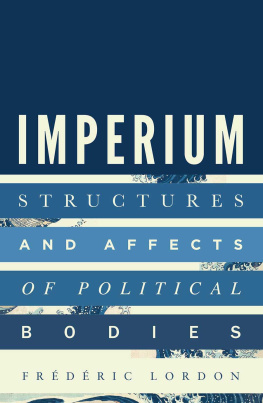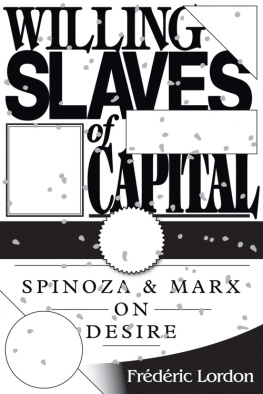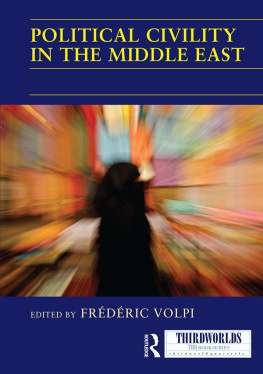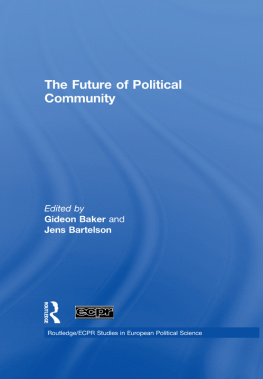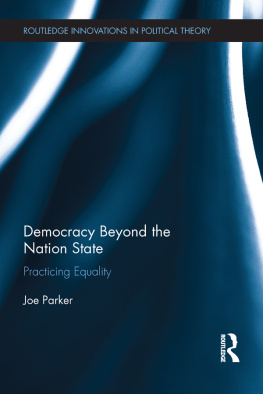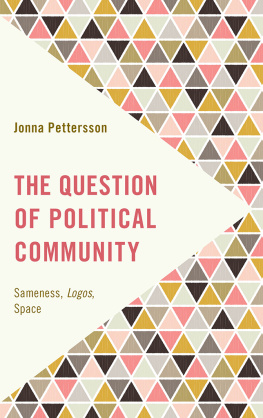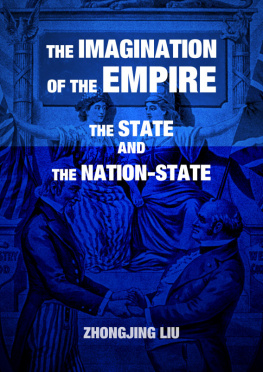Contents

Imperium
FRDRIC LORDON is director of research at CNRS. He focuses his work on blending Spinozas philosophy and approach to social science to create a new theoretical framework called the structuralism of passions. He is the author of Willing Slaves of Capital: Marx and Spinoza. He has been involved in the Nuit Debout movement.
Imperium
Structures and Affects
of Political Bodies
Frdric Lordon
Translated by Andy Bliss


Cet ouvrage publi dans le cadre du programme daide la publication bnficie du soutien du Ministre des Affaires Etrangres et du Service Culturel de lAmbassade de France reprsent aux Etats-Unis.
This work received support from the French Ministry of Foreign Affairs and the Cultural Services of the French Embassy in the United States through their publishing assistance programme.
This work was published with the help of the French Ministry of Culture Centre national du livre
Ouvrage publi avec le concours du Ministre franais charg de la culture Centre national du livre
This work received the French Voices Award for excellence in publication and translation. French Voices is a programme created and funded by the French Embassy in the United States and FACE Foundation.
French Voices logo designed by Serge Bloch
This English-language edition first published by Verso 2022
Translation Andy Bliss 2022
Foreword Alberto Toscano 2022
Originally published in France as Imperium. Structures et affects des corps politiques
La Fabrique 2015
All rights reserved
The moral rights of the authors have been asserted
1 3 5 7 9 10 8 6 4 2
Verso
UK: 6 Meard Street, London W1F 0EG
US: 20 Jay Street, Suite 1010, Brooklyn, NY 11201
versobooks.com
Verso is the imprint of New Left Books
ISBN-13: 978-1-78663-642-3
ISBN-13: 978-1-78663-640-9 (UK EBK)
ISBN-13: 978-1-78663-641-6 (US EBK)
British Library Cataloguing in Publication Data
A catalogue record for this book is available from the British Library
Library of Congress Cataloging-in-Publication Data
A catalog record for this book is available from the Library of Congress
Typeset in Minion Pro by Hewer Text UK Ltd, Edinburgh
Printed and bound by CPI Group (UK) Ltd, Croydon CR0 4YY
Contents
Part I
GROUPINGS
Part II
THE ELEMENTARY STRUCTURES OF POLITICS
Part III
THE HORIZON OF HORIZONTALITY
Foreword: Passions
of State
In a crooked nod to Thomas Hobbess Leviathan, the French edition of Frdric Lordons Spinozist essay on the affective dynamics of our political institutions sports its own frontispiece. Instead of the Mortall God, comprising untold subjects and looming over the Wiltshire landscape, drawn by Abraham Bosse for the 1651 edition of that founding text of our political modernity, we have the nineteenth-century Japanese painter Hokusais universally reproduced The Great Wave Off Kanagawa. This initially perplexing allegory is soon clarified, as we are reminded that Baruch Spinoza, in his unfinished Political Treatise, defined imperium as the right which is determined by the power of a multitude. Lordon, following Bernard Pautrats French translation of the Tractatus Politicus, has opted to keep the term in Latin, wary that other renderings such as dominion or sovereignty would diminish its scope and impact. Albeit constructed out of its alienated subjects, Hobbess state-machine still kept its kingly head; Hokusais wave is nothing but water, and its might is not just charged with menacing dynamism but cresting toward dissolution. The state too, Lordon will insist, is nothing but the multitude once we understand that this multitude cannot but produce an excess or transcendence (that is, a kind of sovereignty), compelled as it is to collect itself into a society. Accordingly, imperium should not be treated as an object of adoration or aversion, fantasy or fear, it merely describes a necessity (p. 1).
Imperium is at one and the same time a polemical as well as a constructive project, firmly aimed at the current French and European political conjuncture, while building on Lordons distinctive research programme. That programme, of a Spinozist social science, was inaugurated in 2002 by La Politique du capital, an inquiry into the conflict that pitted the BNP against Socit Gnrale and Paribas in 1999. That study employed Spinozas notion of conatus the conflictive perseverance in being that in the Ethics individuated any entity or mode to argue for a vision of capital as an intrinsically political and antagonistic relation. This intellectual centaur empirical inquiry wedded to seventeenth-century philosophy is less bizarre than it might at first seem. That a Spinozist social science should be of French coinage is no accident: from the historical scholarship of Martial Gueroult to Alexandre Matherons pioneering study of individual and community in Spinoza, from Gilles Deleuzes radical reinterpretation of Spinozas philosophy of immanence to the centrality of Spinoza to the Althusserian project (not to mention the rich production of Spinozist studies by contemporary scholars in the Hexagon), France has an altogether impressive tradition of Spinoza interpretation. At the heart of this retooling of a seventeenth-century metaphysics for twentieth- and twenty-first-century ideological purposes is the liquidation of that Cartesian subject animating the humanist visions of politics borne by phenomenology and existentialism. While the targets may have changed, Lordons perspective remains anchored in this affirmation of Spinoza as the thinker who can emancipate us from the delusions of free will, allowing us to approach human behaviour in a disabused materialist vein.
In Lintrt souverain (2006), the edited volume Spinoza et les sciences sociales (2008, with Yves Citton), Capitalisme, dsir et servitude (2010, published by Verso in translation as Willing Slaves of Capital), La socit des affects (2013), Les affects de la politique (2016) and La condition anarchique (2018), Lordon has consistently advanced the claim that Spinozas theory of human action, built on the notions of conatus, desire (the essence of human being) and affect (the cause and pattern of desire), is capable, when brought into dialogue with critical and heterodox strands in economics, sociology and anthropology, of undoing paralysing antinomies between individual and collective, structure and agency, while crucially resisting the growing hegemony over the social sciences of a politically loaded metaphysics of liberalism. Against liberal and neo-liberal theories of atomised subjects of choice, Lordon proposes we take inspiration from the author of the Ethics to develop a structuralism of the passions. This is not a combinatorial structuralism la Lvi-Strauss, but the generic assertion which Lordon claims can be sourced in Marx, Bourdieu, Durkheim and Mauss, inter alia that human beings are in the first instance moved by their passions, while in the final analysis these passions are determined by social structures. Unless we jettison political and social philosophies of the subject, he intimates, no such structuralism can emerge, and we shall continue to treat passionate individuals and impersonal structures as incompatible terms, devolved to separate disciplines in a disabling division of intellectual labour.

